Los Leones – The Incredible Story of the Truly Unique Athletic Club Bilbao
07/03/2024 - 12.22
Christopher James Evans
Introduction
The Basque Country, known as Euskal Herria or Euskadi in their homeland, is fascinating. The language – Euskera – is mesmerising, the history enthralling, the politics complicated, the food exquisite, and the geography and weather…well, it reminds me of home.
The Basques love their football – and they are very good at it! The quality of the players and managers that they have produced over the years is almost unbelievable.
Athletic Club Bilbao are undoubtedly the biggest and most famous football club in the Basque Country. Their history is beguiling. Since the club’s formation in 1898 by British migrant workers and Basque students, Los Leones (The Lions) have won 8 league titles and 24 Copa Del Reys.
Yet they are probably most famous internationally for their unique Basque-only philosophy. Despite this philosophy, along with Barcelona and Real Madrid, they have never been relegated from the top-flight in Spain.
The Background and Basque Boys AFC
I think my interest with the Basque Country comes from being Welsh. There is the defiant small nation element to it. Us against them. Both have suffered historical repression culturally, politically, and linguistically. Indeed, both nations fought and continue to fight and defend their strong national identities and cultures. There is nationalism running throughout, but also internationalism and wanting to be part of the globalised world. There is a historical kinship between both nations. Indeed, they were both pioneers of the industrial revolution in Europe. During the Spanish Civil War nearly 200 Welsh volunteers went to Spain to fight for the anti-fascist International Brigades. 35 of those volunteers never came home.
A few years ago I wrote an article about the incredible story of Basque Boys AFC, a refugee football team that formed in my hometown of Caerleon during the Spanish Civil War. By all accounts, the boys were phenomenal, rolling over every team they played against in south Wales. So much so, the local newspaper the South Wales Argus labelled them ‘The Basque Wonder Team’ and ‘The Basque Unbeatables’.
I’ve always had a soft spot for Athletic Club. The aforementioned Basque-only philosophy first sparked my interest (as well as spending far too much time playing Championship Manager in the 90s!), but also Athletic’s mesmerising performances against Manchester United in the Europa League in 2012. Los Leones were outstanding, simply too good for the Red Devils. They completely outplayed a United side that went on to win the Premier League the following season.
I read, researched, and found out as much as I could about Athletic. Quite honestly, I was amazed when I found out that there wasn’t an English language book about the history of the club.
As a representative of the Basque Children Association ’37 UK, in 2022 we were invited by Athletic Club to the opening of their exhibition about the Basque refugee children who had escaped to the UK during the Spanish Civil War. Many of those children went on to play football professionally.
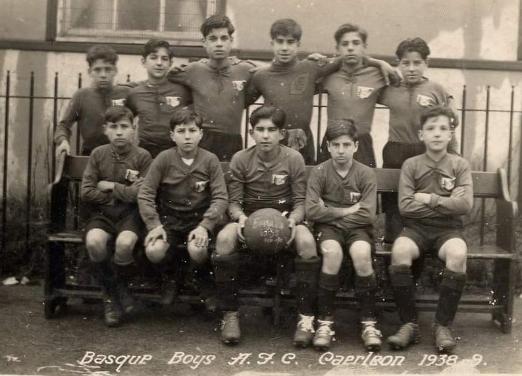
Basque Boys AFC of Caerleon. Source: The Richard Burton Archives, Swansea University
It was a humbling and unforgettable experience and after I interviewed the then president of the club Aitor Elizegi, my mind was made up that I wanted to write a book about Los Leones.
I don’t want to give too much away here, after all, it’s all in the book. But the history of the club really is unique. It is full of myths and legends and a litany of embellished stories - just as all good stories should be!
Here are a few to whet your appetite!
Mr Pentland
There is the story of the Englishman Frederick Beaconsfield Pentland, affectionately known as ‘El Bombín’ (The bowler hat), or ‘El Mister’ Pentland, who during the First World War spent time as an inmate at Ruhleben internment camp on the outskirts of Berlin. Fred Pentland is relatively unknown on our shores but is something of a deity in Bilbao. He is still the most successful manager in Los Leones’ history.
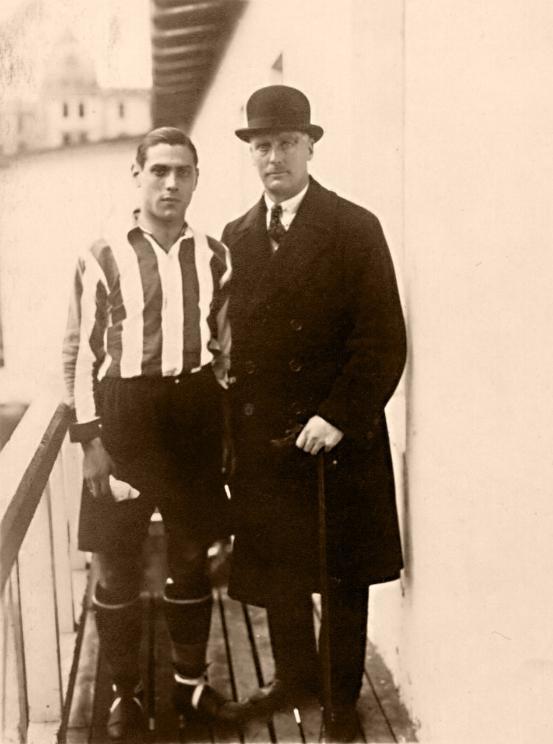
Domingo Acedo (also known as Txomin Acedo) with Mr Pentland. Source: Athletic Club Museum
During two successful stints with Athletic Club, Mr Pentland (who also has a London-based peña named after him) became a legend of the club, success on the pitch and his quirkiness and Englishness off it endearing him to players and fans alike.
The Basque National Team Tour
Another fascinating story involves the Basque national football team, known as Euzkadi. Essentially an extension of Athletic, following the outbreak of the Spanish Civil War the Lehendakari (President) of the Basque Country José Antonio Aguirre, himself a former Athletic player who had won the Copa del Rey with Los Leones in 1923, sanctioned a tour of Europe (and eventually the world) for the team. The aim was for Euzkadi to highlight the plight of the Basque Country and raise funds for the fight against the nefarious General Franco, whose attempted coup d’état in July 1936 had sparked the outbreak of the civil war.
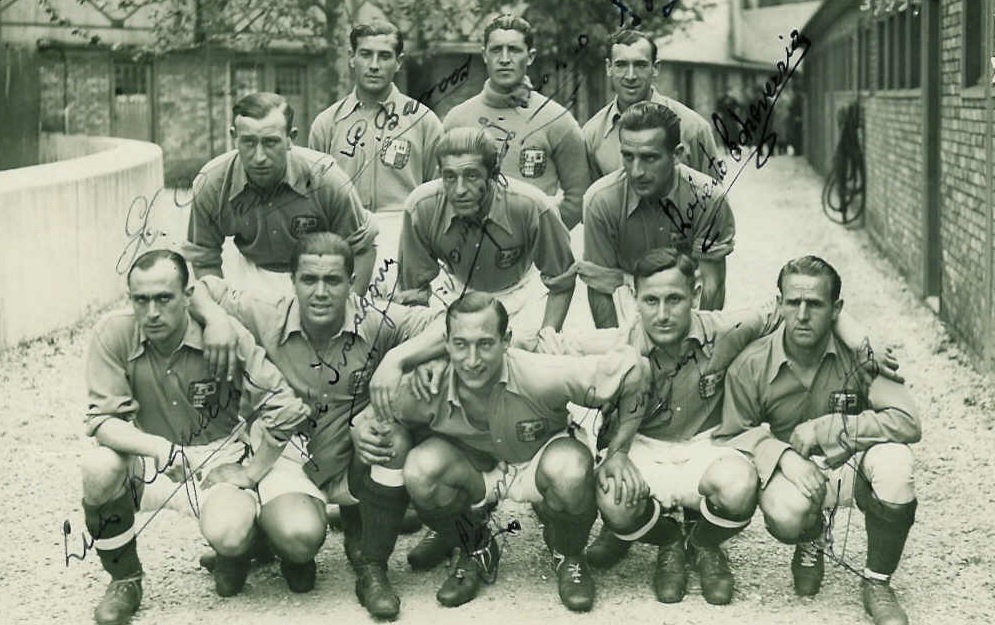
The Euzkadi team who toured the world at the Parc de Princes, Paris, 26 April 1937. Source: Joseba Gotzon Varela
Post-Civil War
The post-civil war years saw Spain face an uncertain future. Things were particularly grim in the Basque Country, Franco’s ‘Terror Blanco’ (‘White Terror’) continuing relentlessly in the aftermath of the war, the fascist regime seemingly intent on destroying anything that didn’t align with their ideology.
Franco’s cruelty and repression unsurprisingly seeped into football and particularly Athletic.
Despite the Francoist repression, the post-war years saw Athletic rise from the ashes and have incredible success. Football, as is so often the case, was a way to restore some pride and passion to a down-but-not-out Basque Country.
The Ikurriña
A historical event that is etched into Basque history also involved Athletic, as well as their main Basque rivals Real Sociedad.
On 5 December 1976, just over a year after the death of Franco, Athletic captain José Ángel Iribar and Real Sociedad captain Inaxio Kortabarria walked on to the pitch at the Atotxa Stadium in Donostia-San Sebastián carrying the still outlawed Basque flag, the Ikurriña. The flag was still illegal in Spain having become synonymous with Basque separatism and the Basque separatist group ETA.
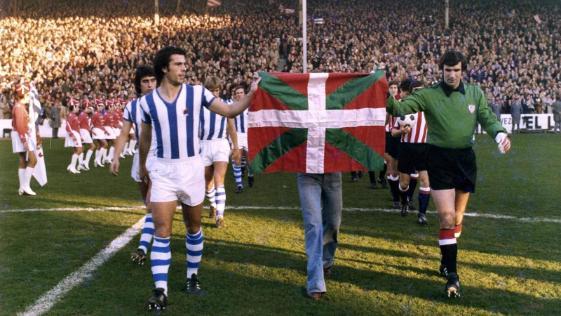
José Ángel Iribar and Inaxio Kortabarria carrying the still-outlawed Ikurriña (the Basque Flag) at the Atotxa Stadium in Donostia-San Sebastián before the Basque derby on 5 December 1976. Source: El Mundo
Modern Times
Football and politics are indisputably intrinsically linked. It really is impossible to separate them. Athletic Club are no exception, and I hope that the book succeeds in covering the intricacies of Athletic’s political, social, and cultural significance to Bizkaia and the Basque Country as a whole.
One thing is for sure, the Basques are a determined and resolute lot and they will continue to leave their unique and distinct stamp on the world for a long time to come.
Reference
Christopher Evans (2021) How a Basque Refugee Football Team Overcame Tragedy to Take Wales by Storm.
Biography
Christopher James Evans is a writer and journalist from south Wales. His debut book Los Leones: The Unique Story of Athletic Club Bilbao tells the incredible story of the intriguing and unique club from the Basque Country. He has been published in numerous national and international publications, often writing about football, history, music, and politics.
The book will be published on the 4th March 2024 by Pitch Publishing.
The book will also be available through all major booksellers such as Amazon, WH Smith and Waterstones.
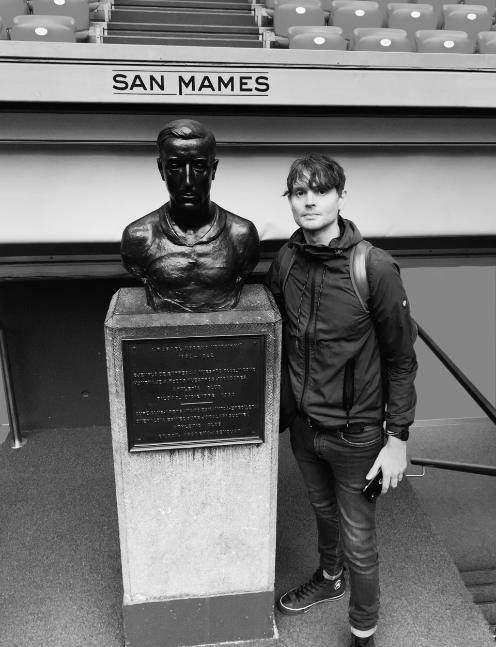


/prod01/wlvacuk/media/departments/digital-content-and-communications/images-18-19/iStock-163641275.jpg)
/prod01/wlvacuk/media/departments/digital-content-and-communications/images-2024/250630-SciFest-1-group-photo-resized-800x450.png)
/prod01/wlvacuk/media/departments/digital-content-and-communications/images-18-19/210818-Iza-and-Mattia-Resized.jpg)
/prod01/wlvacuk/media/departments/digital-content-and-communications/images/Maria-Serria-(teaser-image).jpg)
/prod01/wlvacuk/media/departments/digital-content-and-communications/images-2024/241014-Cyber4ME-Project-Resized.jpg)
/prod01/wlvacuk/media/departments/digital-content-and-communications/images-18-19/210705-bric_LAND_ATTIC_v2_resized.jpg)